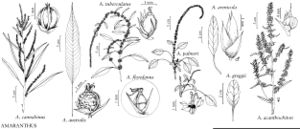Difference between revisions of "Amaranthus cannabinus"
Madroño 13: 11. 1955.
FNA>Volume Importer |
FNA>Volume Importer |
||
| Line 11: | Line 11: | ||
|name=Acnida cannabina | |name=Acnida cannabina | ||
|authority=Linnaeus | |authority=Linnaeus | ||
| + | |rank=species | ||
|publication_title=Sp. Pl. | |publication_title=Sp. Pl. | ||
|publication_place=2: 1027. 1753 | |publication_place=2: 1027. 1753 | ||
| Line 38: | Line 39: | ||
-->{{#Taxon: | -->{{#Taxon: | ||
name=Amaranthus cannabinus | name=Amaranthus cannabinus | ||
| − | |||
|authority=(Linnaeus) J. D. Sauer | |authority=(Linnaeus) J. D. Sauer | ||
|rank=species | |rank=species | ||
| Line 53: | Line 53: | ||
|publication year=1955 | |publication year=1955 | ||
|special status= | |special status= | ||
| − | |source xml=https://jpend@bitbucket.org/aafc-mbb/fna-data-curation.git/src/ | + | |source xml=https://jpend@bitbucket.org/aafc-mbb/fna-data-curation.git/src/f50eec43f223ca0e34566be0b046453a0960e173/coarse_grained_fna_xml/V4/V4_811.xml |
|genus=Amaranthus | |genus=Amaranthus | ||
|subgenus=Amaranthus subg. Acnida | |subgenus=Amaranthus subg. Acnida | ||
Revision as of 21:43, 16 December 2019
Stems erect, branched, stout, usually 1–3 m. Leaves: petiole 1/2 length of blade; blade lanceolate or narrowly lanceolate to linear, to 20 × 4 cm, base narrowly cuneate, margins entire, plane to slightly undulate, apex acute to acuminate. Inflorescences mostly terminal, narrow spikes or thyrses, usually interrupted, linear. Bracts: of pistillate flowers 1.5 mm; of staminate flowers with midribs not prominent, scarcely excurrent, shorter than 1 mm. Pistillate flowers: tepals absent or 1–2 and rudimentary; style branches ± erect; stigmas 3–5. Staminate flowers: tepals 5, without prominent midribs, equal, 2.5–3 mm, apex obtuse to indistinctly mucronulate in outer tepals; stamens 3–5. Utricles often black, with 3(–5) longitudinal ridges corresponding to 3–5 style branches, ovoid or obovoid, 2.5–4 mm (exceeding tepals, when present), somewhat fleshy, smooth (slightly rugose, especially in herbarium specimens). Seeds reddish brown to dark brown, 2–3 mm diam., shiny.
Phenology: Flowering summer–fall.
Habitat: Coastal salt or brackish marshes, edges of sloughs, tidal riverbanks, tidal flats, rarely freshwater semiaquatic habitats
Elevation: 0-50 m
Distribution
Ala., Conn., Del., D.C., Fla., Ga., Maine, Md., Mass., N.H., N.J., N.Y., N.C., Pa., R.I., S.C., Vt., Va.
Discussion
Reports of Amaranthus cannabinus from southern Florida and the Gulf Coastal Plain are the result of misidentifications of A. australis. According to J. D. Sauer (1955), plants of A. cannabinus from northern coastal Atlantic Florida are atypical and probably represent hybrid populations transitional toward A. australis.
Selected References
None.
